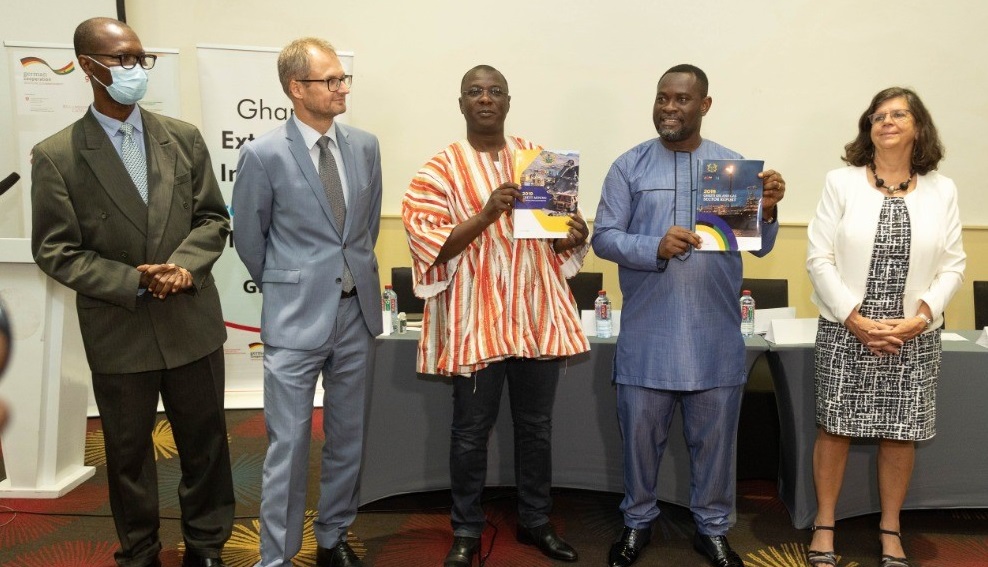Accra, 14th April 2022 - The Ministry of Finance and the Ghana Extractive Industries Transparency Initiative (GHEITI) in collaboration with GIZ have launched the 2019 Reports for the Mining and Oil and Gas Sectors in Accra.
The objectives of GHEITI Reports were to create the required public awareness, generate interest and debate on the issues raised in the reports, and pave way for stakeholder’s engagements on the reports as required by the Extractive Industries Transparency Initiative (EITI) Standard.
It was also to check disbursements and utilization of Mineral royalty/Ground rent and utilize lessons learnt from the reconciliation exercise to enhance transparency in payments, receipts, disbursements, and utilization.
A deputy Minister of Finance, Hon Dr. John Ampontuah Kumah in his keynote address stated that, Ghana was endowed with mineral resources and had a well-established mining sector, which had grown considerably in recent years to represent an important pillar of the Ghanaian economy.

“The mining sector currently contributes approximately 41 percent of total exports earnings, 14 percent of total tax revenues, and 5.5 percent of Ghana's Gross Domestic Product (GDP). Gold contributes over 90% of Ghana's total mineral exports and makes up 49% of the country's total export value. Ghana is the leading African gold producer, with a total mine production amounting to 150 metric tons as at end 2020”, he noted.
Dr. John Kumah added that, the contribution of the upstream oil and gas sector to energy generation in Ghana could not be over-emphasized and that Ghana EITI with the support of the Multi-Stakeholder Group (MSG) had so far
produced 16 EITI Reports in the mining sector and nine reports for the oil and gas sector.
The MP for Ejisu constituency further disclosed that, the most recent comprehensive data on labour found in the Ghana Living Standard Survey (GLSS 7) was conducted between 2016 and 2017 and was published in 2019.
The survey, he continued, showed that, the mining sector accounted for 1.5 per cent of the country’s employed population which indicated the critical role the mining sector played in terms of employment generation in the country.
Giving a breakdown of the sectoral performance, the Deputy Minister hinted that, in the oil and gas sector, a total revenue of US$ 666,390,751 accrued to the State in the year 2020 from Royalties, Carried and Participating Interest (CAPI), Corporate Income Taxes (CIT) and Surface Rentals.
The government also received US$ 225,301 as income earned on the Petroleum Holding Fund (PHF). The petroleum sector total receipt of US$ 666.39 million in 2020 contributed seven percent (7%) of total government (domestic) revenue for that year.
A total of 3,711 employees were engaged in the upstream petroleum sector, 3,211 being Ghanaians and 500 expatriates as part of efforts by government to reduce the unemployment rate in the country.
He said the government also received US$225,301 as income earned on the Petroleum Holding Fund. The petroleum sector's total receipt of US$666.39 million in 2020 contributed seven per cent of total government (domestic) revenue for that year.
Dr. Mohammed Amin Adam, a Deputy Minister of Energy and Member for Parliament for Karaga in the Northern Region, in his speech said, the notably impressive numbers mentioned by the deputy Minister for Finance, could not be sustained as COVID19 pandemic and the transition towards cleaner fuels heavily impacted the oil and gas industry
“Ladies and Gentlemen, per the EITI standards, it is obligatory for GHEITI-MSG to launch and disseminate the findings and recommendations of the reports on the mining and oil & gas sectors to stakeholders”, he indicated.
He called for all-inclusiveness in propagating the findings and recommendations of the reports as Ghana seeks to ensure accountability and transparency in the extractive sector.
“It is only when stakeholders take responsibility for the various aspects of the reports that we can efficiently address and reform our institutions to respond to the needs of our times” Mr. Amin added.
He said the EITI standard was more vigorous, more relevant, and a good instrument for citizens to seek accountability. The EITI Standard and its requirements were continuously being refined to reflect the changing dynamic in the extractive sector.
H.E Philipp Stalder, Swizz Ambassador to Ghana, Togo, and Benin, and Country Director for GIZ, Regina B. Babosa, in their solidarity speeches, praised the government's pursuit of openness and transparency in the extractive sector and pledged their support to rally behind the government's efforts.
The launch was attended by industry players in the extractive sectors, representatives from international bodies like the UNDP and the media. END
